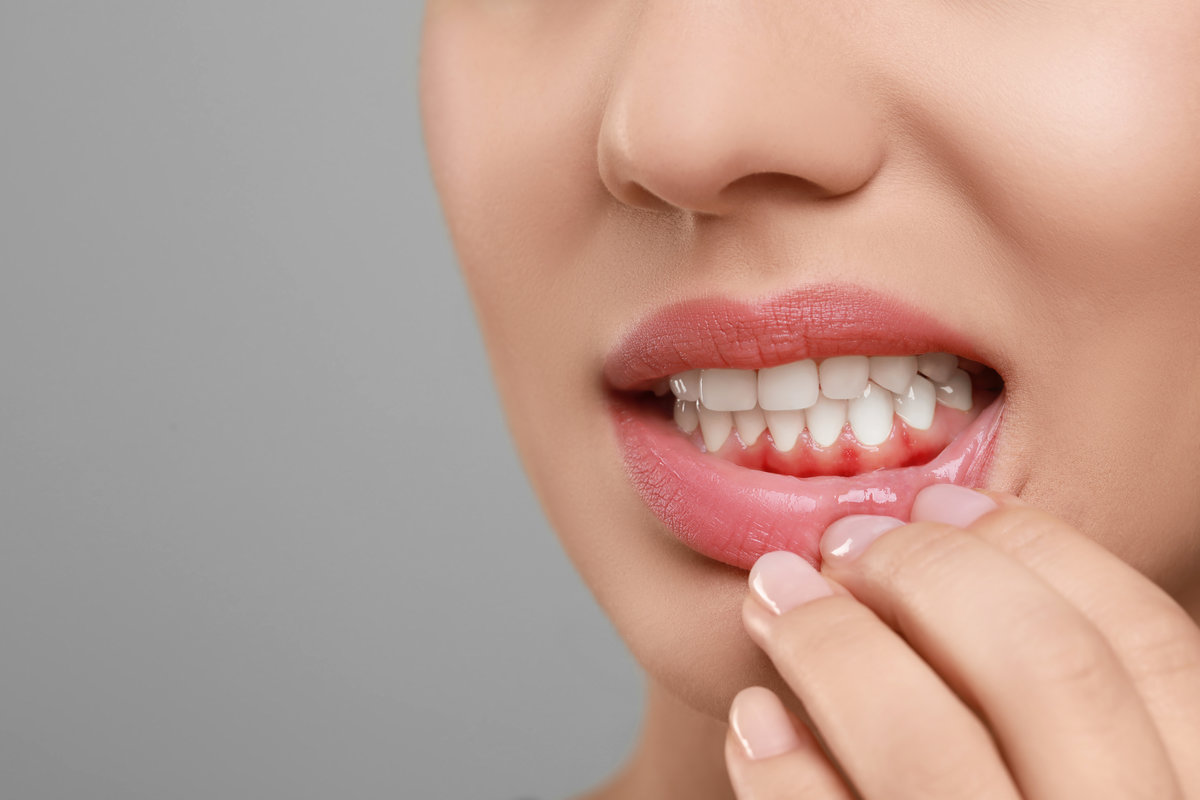Accepting New Patients
At Oasis Dental, we understand that healthy gums are the foundation of a healthy smile. Gum disease affects nearly half of all adults over 30, yet many people don’t realize they have it until significant damage has occurred. Dr. Sagar Amin provides comprehensive gum disease treatment to stop infection, restore gum health, and protect your teeth from loss. Early detection and treatment are key to preserving your natural teeth and overall health.
If your gums bleed when you brush or if you’ve noticed changes in your gum tissue, don’t wait to seek treatment.

Gum disease, also called periodontal disease, is an infection of the tissues that support your teeth. It begins when bacteria in plaque irritate and inflame your gums. Without treatment, the infection progresses deeper, eventually affecting the bone that holds your teeth in place.
Gum disease develops in stages. Gingivitis is the earliest and mildest form. At this stage, your gums become red, swollen, and may bleed when you brush or floss. The good news is that gingivitis is reversible with proper treatment and improved oral hygiene. No permanent damage has occurred yet.
If gingivitis is left untreated, it progresses to periodontitis. At this stage, the infection spreads below the gum line, causing your gums to pull away from your teeth and form pockets. These pockets collect more bacteria, food debris, and plaque, accelerating the disease. Your body’s immune response to the infection begins breaking down the bone and connective tissue that hold your teeth in place.
Advanced periodontitis is the most severe stage. The connective tissue and bone are extensively destroyed, causing teeth to loosen or shift. Without treatment, tooth loss is inevitable. The infection may also affect your overall health, as the bacteria can enter your bloodstream.
Complete dental care for every member of your family with financing options that fit your budget.

Many people have gum disease without realizing it because early stages are often painless. Watch for these warning signs. Red, swollen, or tender gums are an early indication of inflammation. Healthy gums should be pink and firm, not puffy or sensitive to touch.
Bleeding gums when you brush, floss, or eat hard foods is never normal. While some people dismiss this as “brushing too hard,” bleeding gums almost always indicate gum disease. Persistent bad breath or a bad taste in your mouth that doesn’t go away with brushing suggests bacterial buildup associated with gum disease.
Receding gums make your teeth look longer than normal. As gums pull away from teeth, more of the tooth surface and eventually the root become visible. This recession also creates pockets where bacteria can accumulate. Changes in how your teeth fit together when you bite or changes in the fit of partial dentures indicate bone loss and shifting teeth.
Loose or separating teeth are a serious sign of advanced gum disease. The supporting bone has been damaged, and teeth begin to move or feel unstable. Pus between your teeth and gums signals an active infection that needs immediate attention.
If you notice any of these symptoms, schedule an appointment at Oasis Dental right away. Early treatment prevents progression and protects your teeth.
Poor oral hygiene is the primary cause of gum disease. When plaque isn’t removed daily through brushing and flossing, it hardens into tartar that can only be removed professionally. The bacteria in plaque and tartar constantly irritate your gums, leading to infection.
Several factors increase your risk of developing gum disease. Smoking and tobacco use are among the most significant risk factors. Tobacco weakens your immune system’s ability to fight infection and slows healing. Smokers are much more likely to develop gum disease and experience more severe cases.
Genetics play a role. Some people are simply more susceptible to gum disease, even with good oral hygiene. If your parents had gum disease, you may be at higher risk. Hormonal changes in women during pregnancy, puberty, menopause, and monthly menstruation make gums more sensitive and susceptible to disease.
Certain medications reduce saliva flow, which normally helps protect your gums by washing away bacteria. Dry mouth increases your risk of gum disease. Diseases that affect your immune system, such as diabetes, cancer, and HIV, make you more vulnerable to infections including gum disease. In fact, diabetes and gum disease have a two-way relationship, with each condition making the other worse.
Poor nutrition, particularly vitamin C deficiency, can compromise gum health. Stress affects your body’s ability to fight infection, including gum infections. Crooked teeth that are difficult to clean properly increase plaque accumulation and gum disease risk.
Treatment for gum disease depends on its severity. For gingivitis, professional cleaning combined with improved home care is usually sufficient. Our hygienist will remove all plaque and tartar from your teeth during a thorough cleaning. Dr. Amin will provide guidance on improving your brushing and flossing techniques and may recommend antimicrobial mouth rinse.
For periodontitis, more intensive treatment called scaling and root planing is needed. This deep cleaning procedure is sometimes called a “deep cleaning.” Scaling removes plaque and tartar from above and below the gum line, including bacteria from the pockets around your teeth. Root planing smooths the tooth roots, helping your gums reattach to your teeth and making it harder for bacteria to accumulate in the future.
Scaling and root planing is typically performed in sections over two to four appointments. We’ll numb the area being treated to ensure your comfort. Most patients experience minimal discomfort during and after the procedure. For advanced cases, Dr. Amin may prescribe antibiotics to help control bacterial infection. These may be pills you take orally or antibiotic gel placed directly into gum pockets.
After initial treatment, maintenance cleanings every three to four months are usually necessary to keep gum disease under control and prevent recurrence. These cleanings are more frequent than the standard six-month cleanings for patients with healthy gums.
At Oasis Dental, we offer advanced laser dentistry as part of our gum disease treatment options. Dental lasers can target and remove infected gum tissue and bacteria while leaving healthy tissue intact. Laser treatment offers several benefits including less discomfort during and after treatment, reduced bleeding and swelling, faster healing time, and often less need for anesthesia.
Laser treatment is particularly effective for moderate periodontitis and can sometimes reduce the need for more invasive surgical procedures. Dr. Amin will determine if laser therapy is appropriate for your specific situation.
When gum disease has caused significant bone loss, surgical treatment may be necessary. Flap surgery involves lifting back the gums to remove tartar deposits in deep pockets. The gums are then sutured back in place to fit more snugly around the tooth, reducing pocket depth.
Bone grafts replace bone destroyed by gum disease, providing a foundation for natural bone regeneration. Soft tissue grafts can cover exposed roots caused by gum recession, protecting them from decay and sensitivity. Guided tissue regeneration encourages natural bone and tissue regrowth in areas destroyed by gum disease.
Dr. Amin will discuss whether surgical treatment is necessary and refer you to a trusted periodontist if specialized care is needed.
Professional treatment is essential, but your daily home care routine determines long-term success. Brush your teeth at least twice daily using a soft-bristled toothbrush. Electric toothbrushes are often more effective at removing plaque. Hold your toothbrush at a 45-degree angle to your gums and use gentle circular motions.
Floss every single day. This is not optional if you have gum disease. Flossing removes bacteria and food particles from between teeth where your toothbrush cannot reach. Use an antimicrobial mouth rinse if recommended by Dr. Amin to help reduce bacteria and control inflammation.
Avoid tobacco in all forms. If you smoke or use tobacco products, quitting is the single most important thing you can do for your gum health. We can provide resources and support to help you quit. Eat a balanced, nutritious diet and limit sugary snacks and drinks. Good nutrition supports your immune system and healing.
Manage stress through exercise, meditation, or other healthy techniques. Chronic stress weakens your immune response and can worsen gum disease. Stay hydrated by drinking plenty of water throughout the day to help wash away bacteria and keep your mouth moist.
Gum disease doesn’t just affect your mouth. Research has shown links between periodontal disease and several serious health conditions. The bacteria from gum disease can enter your bloodstream and contribute to heart disease and increase your risk of stroke.
People with diabetes are more likely to have gum disease, and gum disease makes it harder to control blood sugar levels. This creates a dangerous cycle. Pregnant women with gum disease have a higher risk of premature birth and low birth weight babies. The inflammation from gum disease may also be linked to respiratory diseases, rheumatoid arthritis, and certain types of cancer.
Treating gum disease isn’t just about saving your teeth—it’s about protecting your overall health and wellbeing.
Prevention is always easier than treatment. Maintain excellent oral hygiene by brushing twice daily and flossing once a day without fail. Visit Oasis Dental every six months for professional cleanings and exams. Regular checkups allow us to catch gum disease in its earliest, most treatable stage.
Don’t smoke or use tobacco products. Quit if you currently use tobacco. Eat a healthy, balanced diet rich in vitamins and minerals. Manage health conditions like diabetes that increase your risk of gum disease. Replace your toothbrush every three to four months or sooner if bristles become frayed.
Dr. Sagar Amin provides comprehensive, gentle care for patients with gum disease. Our practice uses advanced technology including laser dentistry to provide comfortable, effective treatment. We create personalized treatment plans based on the severity of your condition and your individual needs.
We understand that gum disease can feel overwhelming, and we’re here to support you every step of the way. Our team provides thorough education about your condition and what you can do to improve your gum health. We work with you to develop realistic home care routines that fit your lifestyle.
Our comfortable, modern office creates a welcoming environment where you can feel at ease during treatment. We accept most insurance plans and offer flexible payment options to make gum disease treatment accessible.
Gum disease won’t improve on its own—it will only get worse without treatment. The earlier you address it, the easier it is to treat and the better your outcomes will be. Contact Oasis Dental today to schedule an appointment with Dr. Amin. We’ll evaluate your gum health, discuss your treatment options, and create a plan to restore your gums and protect your teeth.
Your gums support your teeth and your smile. Let us help you keep them healthy for life.
